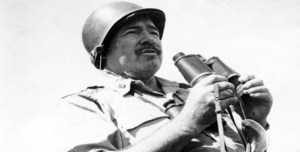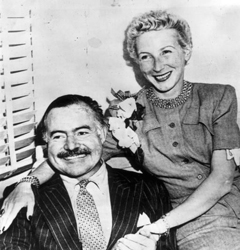Are You Half This Much Man?
“The first woman you ever slept with was a prostitute, of course?” asked Gisors… “What did you feel afterwards?”
Ch’en clenched his fists.
“Pride.”
“At being a man?”
“At not being a woman.”
This is dialogue between Asian communist revolutionaries quoted from Andre Malraux’s novel “Man’s Fate.” So much has changed for us men since 1936.
Today, masculinity seems obsolete and shameful, since it is held to be responsible for all wars and crimes. Men, it seems, are eternally guilty of having committed History. Our public schools, administered for the most part by women, systematically punish normal instincts in boys. Pride in manhood must be broken early and thoroughly because virility is only admirable in women.
Yet, this same deep-focused historical perspective equally reveals William Blake’s “Eternal Female.” And because, from earliest girlhood, females, pretty or not, constantly feel the cool appraising stare of males, “the fair sex” is forever self-conscious. Nowadays, eye to eye with men, she is also expected to feel especially self-conscious about not being more of a man herself.
Our human nature balances ladies’ vanities against what men, in return, always and everywhere see demanded of them by a women’s glance, which is to demonstrate not handsome comeliness so much as the irrefutable force of masculine will in action. And, like it or not, most men just want to win and don’t much care how they look doing it. After all, women are drawn to winners, however ill-favored of face or figure.
A few of the traditional masculine virtues — once upon a time held to be instinctive — are self-reliance, a will to dominate balanced by a desire to protect, and a scrupulous overall sense of what is fair. Why else play games, growing up, if not to explore these very traits? And boys and men naturally fall in behind fellows in whom they sense a superabundance of masculine resources. We speak of natural leaders. Such a man was Nobel Prize Laureate Ernest Hemingway.
In the 20th century, no masculinity was more disputed than Ernest Hemingway’s. Papa, as he grew to be called, was so effortlessly manly, he became a slightly hysterical scandal among women of both sexes. To this day, in schools, students are still carefully instructed to construe Ernest’s indomitable virility as a clever public disguise for an inner and, to him, shameful excess of femininity, like a gay actor, self-conscious as any girl, forever playing at being a tough guy.
If there is also in this world an Eternal Male, how sub specie aeternitatis are the disparaged swinging-dicks of these latter days to discover what we ought to expect of ourselves? Here, for our comparison, is an admittedly extreme model. Watch Hemingway in action, as glimpsed in his letters to professional-soldier pals who would certainly know if he were lying, or else to literary gents whom he admired and so reported to honestly — perhaps, to exorcise personal demons, but never just to brag or boast.
Is this Hemingway, to us now, a good man, an admirable person? Is something like this what a man ought to try to be? And, if so, who’s stopping us and, above all, why?
Note: Hemingway never went to college. He became an international war correspondent for the Toronto Star almost straight out of high school. Ultra-literate as his reportage and fiction was, his correspondences’ spelling and grammar and syntax were ad-libbed, a drink or two into the day, because he hated writing letters and refused to fuss over them. Rather than stop the action to explain who everybody is he refers to, let’s just overhear a little of what he had to say.
From the Selected Letters (1917 – 1961) of Ernest Hemingway…
To Colonel Charles T. Lanham April 20, 1945… “At the shooting club last Saturday one of the members said, they had evidently been having an argument, “Ernesto you were never actually under fire were you?” “Shit no,” I said, “Do you think I’m crazy?”
To publisher Charles Scribner August 27, 1949… “One time I killed a snotty SS kraut who, when I told him I would kill him unless he revealed what his escape route signs were said: You will not kill me, the kraut stated. Because you are afraid to and because you are a race of mongrel degenerates. Besides it is against the Geneva Convention.
“What a mistake you made, brother, I told him and shot him three times in the belly fast and then, when he went down on his knees, shot him on the topside so his brains came out of his mouth or I guess it was his nose.
“So the next SS I interrogated talked wonderfully… After that we chased them very fast because we knew exactly what the signs they chalked up meant and who and how many they were.
“Will now try to go back to being a christian again.”
To F. Scott Fitzgerald biographer Arthur Mizener May 12, 1950… “Could it be that I have been shot twice through the scrotam and through the right hand, left hand, right foot and left foot and through both knees and the head? (Not to mention seven serious battlefield concussions.)”
To Arthur Mizener June 2, 1950… “I have 22 wounds that are visible… and have killed 122 sures beside the possibles. The last, no not the last, but the one made me feel the worst, was a soldier in a German uniform with helmet rideing on a bicycle along their escape route toward Aachen they (that) we had gotten astride of above St. Quentin. I did not want them to fire the fifty’s and maybe spook others that would be coming in vehicles so I said, “Let me take him” and I shot him with an M1. When we went over to search him and re-set the trap he was a boy of about the age of my son Patrick at the time and I had shot him through the spine and the bullet had come out through the liver. There was not any way to get him back and so I laid him out as comfortable as possible and gave him my morphine tablets and a French kid came up and wanted the bicycle because the German’s had stolen his and we gave it to him and told him to get the hell into the estaminet at the cross-roads and we re-set the trap.”
To Charles Scribner June 28, 1947… “Been rugged here (at Vinca Vigia, Cuba) with (son) Patrick and (wife) Mary both so sick. This is the 76th day with Patrick… We had to feed Patrick rectally for 45 days. He’s eating fine now, regaining weight, getting very strong and completely lucid for as many as four and five hours at a time.”
To General Charles T. Lanham August 25, 1946… “Came in here (Casper, Wyoming) a week ago tonight. Casper that is; not the hospital. Monday morning (19 August) while I was packing the car Mary woke 0700 in great pain. To skip details: was a tubular pregnancy and tube had burst. Got best local surgeon and got her to this hospital. Very heavy internal hemmorage. Had to try to get enough fluid and plasma into her so she would be operable. Finally operated at 2030 Monday night. While Dr. was administering the spinal anaesthetic preparatory to operating M’s veins collapsed, there was no pulse and he could not get a needle in to give plasma. Dr. told me was hopeless; impossible to operate; she couldn’t stand the shock; to tell her goodbye (useless manoever since she unconscious). I got asst. to cut for a vein and got plasma going (they were very short handed and the plasma tubeing had bubbles in it and a too tightly plugged air vent and wouldn’t flow). I took over the plasma administration, cleared line by milking the tube down and raising and tilting until we got it flowing, and by the latter end of the first pint she was coming back enough so that insisted they operate.
“To skip again: She took 4 bottles of plasma during operation, two blood transfusions after, been under oxygen tent ever since and now today is feeling fine, blood count O.K., pulse and temperature normal and will have stitches out next Wed. or Thursday. Ate a good breakfast this am and will have lunch shortly. They removed the ruptured tube and other tube and all other organs are intact and OK.
“But Buck it was closest one I’ve ever seen. Dr. had given her up — and taken off his gloves. Certainly shows never pays to quit… Was closest I’ve ever seen with anybody.”
Also, he won the Nobel Prize for Literature. Read him sometime, man.

